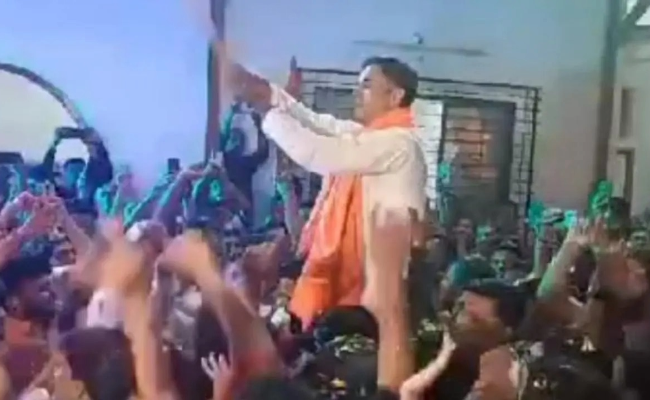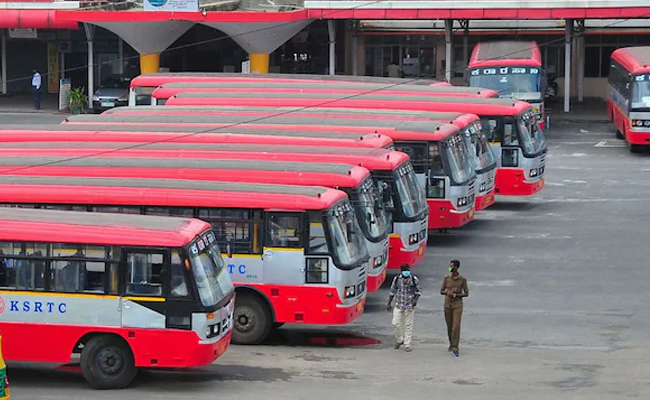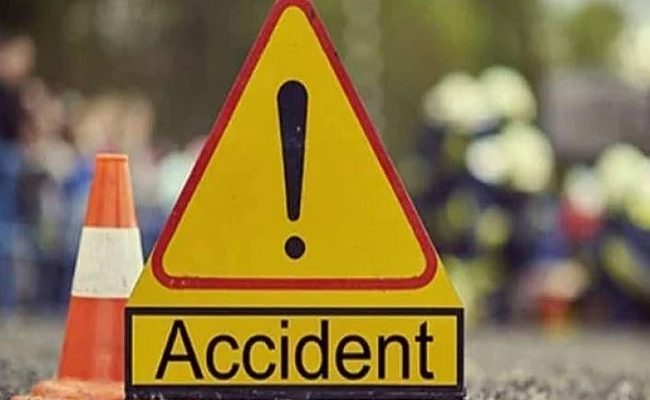Mumbai: Vaibhav Raut, a member of the Hindutva militant group Sanatan Sanstha, received an grand welcome from a gathering of Hindutva supporters in Nalasopara after being released on bail. Raut had been imprisoned for his alleged involvement in a plot to bomb the Sunburn music festival in Pune in 2017.
Videos circulating online depicted men and women adorned in saffron clothing, dancing to the tunes of a DJ song while welcoming Raut back into the community.
Raut had been held at Arthur Road jail since his arrest by the Maharashtra Anti-Terrorism Squad (ATS) in 2018. Following his arrest in August 2018, law enforcement officers discovered a hidden room in Raut’s house containing a significant cache of arms, including country-made pistols, crude bombs, electronics, airguns, ammunition, and various documents.
The relief for Raut came when a division bench of Justice Revati Mohite Dere and Justice Gauri Godse granted bail. The decision was made on September 20, although the details of the order were made available last Friday. The grounds for his release included the fact that he had been incarcerated for more than five years, and the trial was not expected to conclude in the near future.
A 44-year-old right-wing activist Vaibhav Raut, who was imprisoned in Arthur Road jail in connection with UAPA for allegedly plotting to bomb #Sunburn music festival in Pune in 2017, received a grand welcome in #Nalasopara after Bombay HC granted him bailhttps://t.co/ucTpGUjL3c pic.twitter.com/2Q7x83Qu0x
— Diwakar Sharma (@DiwakarSharmaa) October 13, 2023
Let the Truth be known. If you read VB and like VB, please be a VB Supporter and Help us deliver the Truth to one and all.
Bengaluru (PTI): The Karnataka Cabinet on Thursday approved the implementation of the Shakti Smart Card and the National Common Mobility Card (NCMC) across the four State Transport Undertakings (STUs) to streamline fare collection and enhance transparency under the flagship Shakti free bus travel scheme for women.
Shakti scheme is one of the five guarantees of the Congress government, offering free bus rides to Karnataka women in non-luxury government bus.
The was rolled out on June 11, 2023 and till now, women were allowed to travel by showing identity cards, especially the Aadhaar cards.
ALSO READ: Seven people killed in multi-vehicle chain collision in Karnataka
The decision comes in the backdrop of the scheme’s massive uptake, with more than 660 crore free journeys undertaken by eligible women beneficiaries as of January 2026 and an average of 75.68 lakh women availing the service daily across four state transport corporations in Karnataka - KSRTC, BMTC, NWKRTC and KKRTC.
Announcing the decision, Karnataka Law and Parliamentary Affairs Minister H K Patil said, “As of January 2026, eligible women beneficiaries have undertaken more than 660 crore free journeys under the Shakti scheme, with an average of 75.68 lakh women availing free services daily across the four STUs.”
He said the Cabinet had granted administrative approval for the roll-out of the Shakti Smart Card and NCMC to facilitate an integrated, contactless and interoperable fare collection system for both free and fare-paying passengers. “This volume of passengers not only underscores the operational success of the scheme but also highlights the need for transparency, financial accountability and data-driven policy decisions enabled through a technology-based system,” Patil said.
The Cabinet also approved the formation of a legally recognised entity and operational Special Purpose Vehicle (SPV), jointly owned by the four STUs and a selected System Integrator (SI), for the implementation, financial management and long-term sustainability of the Shakti Smart Card scheme.
In addition, approval was accorded to open a Common Pool Escrow Account in compliance with the Reserve Bank of India guidelines for Prepaid Payment Instruments (PPIs) to manage passenger fund settlements and interest accruals.
KSRTC has been designated as the State Nodal Agency to manage the Common Pool Account on behalf of all participating STUs and coordinate with banks, regulatory bodies and other stakeholders.





